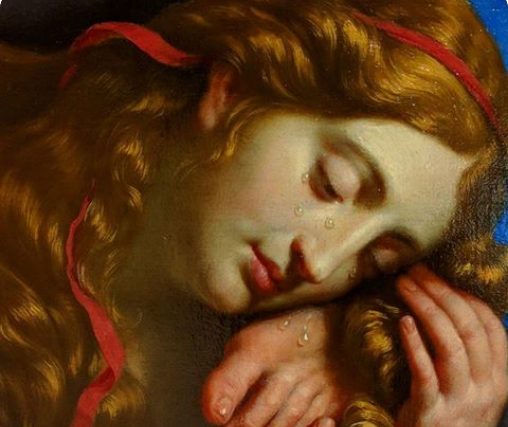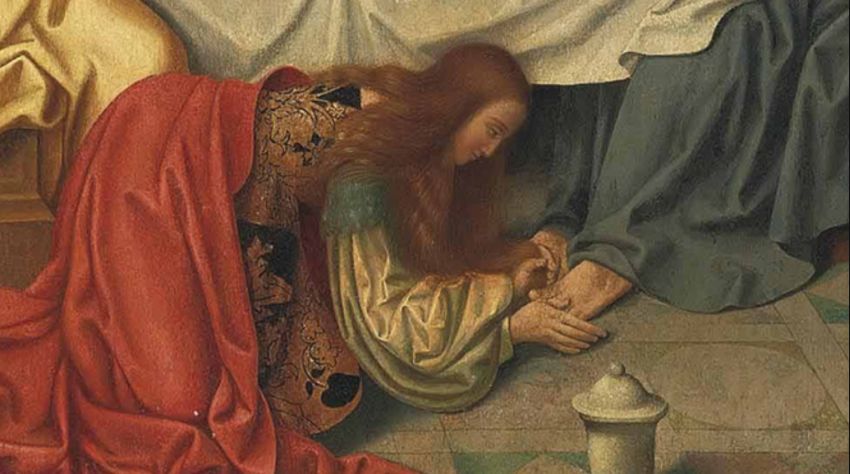Blessed Schuster’s Daily Thoughts on the Rule: Passion Thursday
Passion Thursday
Station at Saint Apollinaris
The Sinful Woman Converted
 1. Today the Station is at St Apollinaris, not far from the Baths of Agrippa and the Ara Pacis Augustae. The Gospel pericope narrates the conversion of an anonymous sinful woman (Luke 7:36-50), whom some Latin Doctors, however, later identified with Mary, sister of Lazarus, or with the other Mary, of Magdala, whom we find with Our Lady on Calvary.1 Generally, the Greeks distinguish three different persons.
1. Today the Station is at St Apollinaris, not far from the Baths of Agrippa and the Ara Pacis Augustae. The Gospel pericope narrates the conversion of an anonymous sinful woman (Luke 7:36-50), whom some Latin Doctors, however, later identified with Mary, sister of Lazarus, or with the other Mary, of Magdala, whom we find with Our Lady on Calvary.1 Generally, the Greeks distinguish three different persons.
The narrator is Saint Luke, whom Dante therefore calls: Scriba mansuetudinis Christi [the scribe of Christ’s meekness].
A fine specimen is that Pharisee, who first invites the Lord to table, and then fails in the usual norms of civility and politeness towards the guest. On His arrival He does not give Him the kiss of peace, nor water for His hands and feet. During the banquet, he skimps even on the perfumed oil on the long hair.
But then, why did he call Him? For some secondary purpose: to study Him better, to take stock personally of the disfavour and discredit which His doctrine earns among his colleagues in the Sanhedrin.
Religious should not give credence readily to the compliments of the worldly when they insist on inviting them to their houses. They almost always lose thereby, and Religion loses likewise.
The Crucifix should be seen at a distance and on the high altar of the Church: that is its place.
Saint Benedict absolutely does not want his monks to take food outside the monastery, when they are able to return during the day etiam si omnino rogetur a quovis. (Rule, Ch. 51: ‘Even if he be entreated by anyone whatsoever.’) Now, imagine for yourself if he would allow them to go to dine here and there in the houses of friends!
***
2. ‘Simon, I have something to say to you.’—‘Master, speak.’
In the rules for speaking, the Cassinese Patriarch [Saint Benedict] teaches the disciple not to open his mouth if he is not questioned, in conformity with the tradition of the ancient philosophical schools. Jesus, before beginning to speak at table, politely asks permission from the head of the house, and after He has set forth the parable of the b![]() eneficent creditor, in deferential terms He asks him his judgment about it: ‘Who does it seem to you ought to be more grateful to him?’
eneficent creditor, in deferential terms He asks him his judgment about it: ‘Who does it seem to you ought to be more grateful to him?’
The art of speaking well is the most difficult to learn, and even the saints hardly escape errors in it. On the other hand, it is such a necessary art that Saint James calls entirely vain the spirituality of him who does not know how to put a bridle on his own tongue.
Now compare for yourself in the Holy Gospel, how when the Divine Master speaks, His utterance bears the characteristics described by Saint Benedict in the 11th degree of humility.
Cum loquitur monachus leniter et sine risu, humiliter cum gravitate, vel pauca verba et rationabilia loquatur, et non sit clamosus in voce. (Rule, Ch. 7: ‘When the monk speaks let it be gentle and serious, with humility and gravity. Let it be of few words, but just ones, and let him not raise the voice too much.’)
Saint Francis de Sales gave these norms for right speaking:
- Little and well.
- Little and useful.
- Little and humble.
Of Saint Hugh of Cluny we read: Silens vero semper cum Domino; loquens vero in Domino, vel de Domino loquebatur. (Being silent, he conversed uninterruptedly with the Lord. Then when he spoke, either it was with the Lord, or it was about Him.)
***
3. ‘Who will be more grateful?’—‘I think that it will be he towards whom he showed himself more generous.’—‘Very good: you are correct.’
The same question could be directed to the devout monk.
To whom has the Lord shown Himself more generous? He has taken you out of the midst of Egypt, to lead you into the promised land of holy Religion; a land in which flow streams of Biblical manna and Eucharistic honey.
Instead of Moses, He has given you as Father and Master Saint Benedict, omnium Iustorum spiritu repletum. (St Gregory, Dialogues II, 8: ‘Full of the Spirit of all the Just.’) For the tablet of the Law, he has presented you the Regula Monasteriorum, which Saint Gregory the Great defines as: discretione praecipuam, sermone luculentam. (St Gregory, Dialogues II, 36: ‘Outstanding for discretion, noble in style.’) All that which you undertake by obedience in the monastery is immediately is transformed for you, without the combinations of alchemy, into precious metal for Paradise. Furthermore, obedience itself becomes for you, O monk, an easy and secure road to ascend to Heaven: Scientes per hanc oboedientiae viam se ituros ad caelum. [sic] (Rule, Ch. 71: ‘Being well persuaded that by this road of obedience one arrives to Heaven.’)
Having therefore received from God so many and such great gifts in preference to those in the world, who will love the Lord more?
Extimo [sic] quia is cui plus donavit. (Luke 7:43: ‘He, I think, to whom He has given more.’)
1 A recent defense of the traditional identification of Mary sister of Lazarus, Mary Magdalene, and the sinful woman in Luke 7 is found in Father Sean Davidson, Saint Mary Magdalene: Apostle of Eucharistic Love (Ignatius).↩

